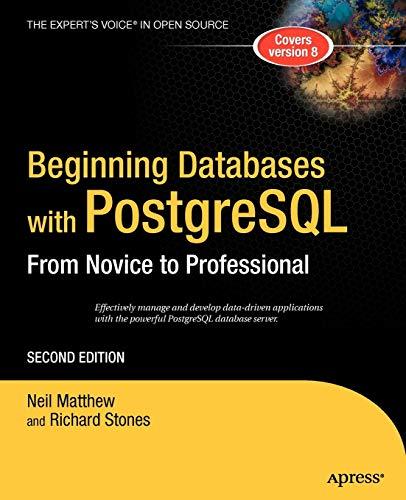Answered step by step
Verified Expert Solution
Question
1 Approved Answer
Please review the following requirements and assumptions before continuing the lab assignment. Requirements The system shall allow students to request enrollment in a course The
Please review the following requirements and assumptions before continuing the lab assignment.
Requirements
The system shall allow students to request enrollment in a course
The system shall allow the registrars office to input courses but will only create new records if the course doesnt already exist in the system
The system shall allow the registrars office to input new student records but will only create new records if the student doesnt already exist in the system
The system shall send reports to the registrars office on course enrollment data
The system shall validate student enrollment requests against current course enrollments to not allow duplicate enrollment in the same course
The system shall enroll students in courses if they are not already enrolled
The system shall return a success or error message to students based on course enrollment transaction status
The system shall store data about all active students eg their unique student id first name, last name, and email address
The system shall store data about all courses eg the unique class id class subject, class number, and class name
The system shall store student enrollment data eg student id class id and enrollment date
Assumptions:
All students are active and eligible for enrollment
Students are not required to enroll in any course, and courses are not required to have any students
Students can only register for a course once
There are no prerequisites for any course
There is no enrollment capacity for each course
Part : Create a Context Level DFD
Build a Context Level DFD using the requirements and assumptions list.
Based on the Requirements list, show the system boundary. Label the system as process and name the process using the proper convention for a Context Level DFD
Determine which elements are external entities users and external systems that will interact with the system process
Include properly labeled inbound and outbound data flows to show the data that flows into and out of the system.
A Remember that data flows are labeled as nounsnonphrases that describe the data that moves into, out of and throughout the system.
Paste your Context Level DFD below here:
Part : Create a Level DFD
Build a Level DFD using the requirements and assumptions list.
Continuing with the example from Part decompose Process from your Context Level Diagram your system into Level DFD to show the internal working processes of your system.
Include the external entities users and external systems from your Context Level Diagram.
A Ensure that the number of external entities remains consistent throughout all levels of the DFDs
B Ensure that the number of data flows into and out of your system remains consistent throughout all levels of the DFDs
Based on the Requirements list, identify data stores and uniquely label them.
A Keep in mind that all data stores must connect to a process and each must have at least one inbound and one outbound data flow.
Decompose Process into several processes.
A Processes should be uniquely numbered and labeled remember numbers are just for reference, they do not indicate order
B The number of processes to include is based on your interpretation of the system.
To show how data flows between all components of the system, include labeled inbound and outbound data flows.
A Be sure to maintain inbound and outbound dataflows to external entities from the Context Level DFD
B It is best practice to start with your boundary data flows from your Context Level DFD to ensure you include all inbound and outbound data flows.
C Remember, all processes must have at least inbound and outbound data flow.
Paste your Level DFD below here:
Part : Create a Level DFD
Build a Level DFD using the requirements and assumptions list.
Continuing with the example from Part decompose all processes from the Level DFD into a Level DFD The goal of decomposing each process is to show the internal subprocesses, data flows, and data stores that exist as you decompose further.
Include the external entities users and external systems from your Context Level Diagram.
A Ensure that the number of external entities remains consistent throughout all levels of the DFDs
B Ensure that the number of data flows into and out of your system remains consistent throughout all levels of the DFDs
Include the data stores from your Level Diagram.
Decompose the processes from your Level Diagram into subprocesses.
A Processes should be uniquely numbered and labeled remember numbers are just for reference, they do not indicate order
B The level of detail subprocesses to include is up to you. H
Step by Step Solution
There are 3 Steps involved in it
Step: 1

Get Instant Access to Expert-Tailored Solutions
See step-by-step solutions with expert insights and AI powered tools for academic success
Step: 2

Step: 3

Ace Your Homework with AI
Get the answers you need in no time with our AI-driven, step-by-step assistance
Get Started


